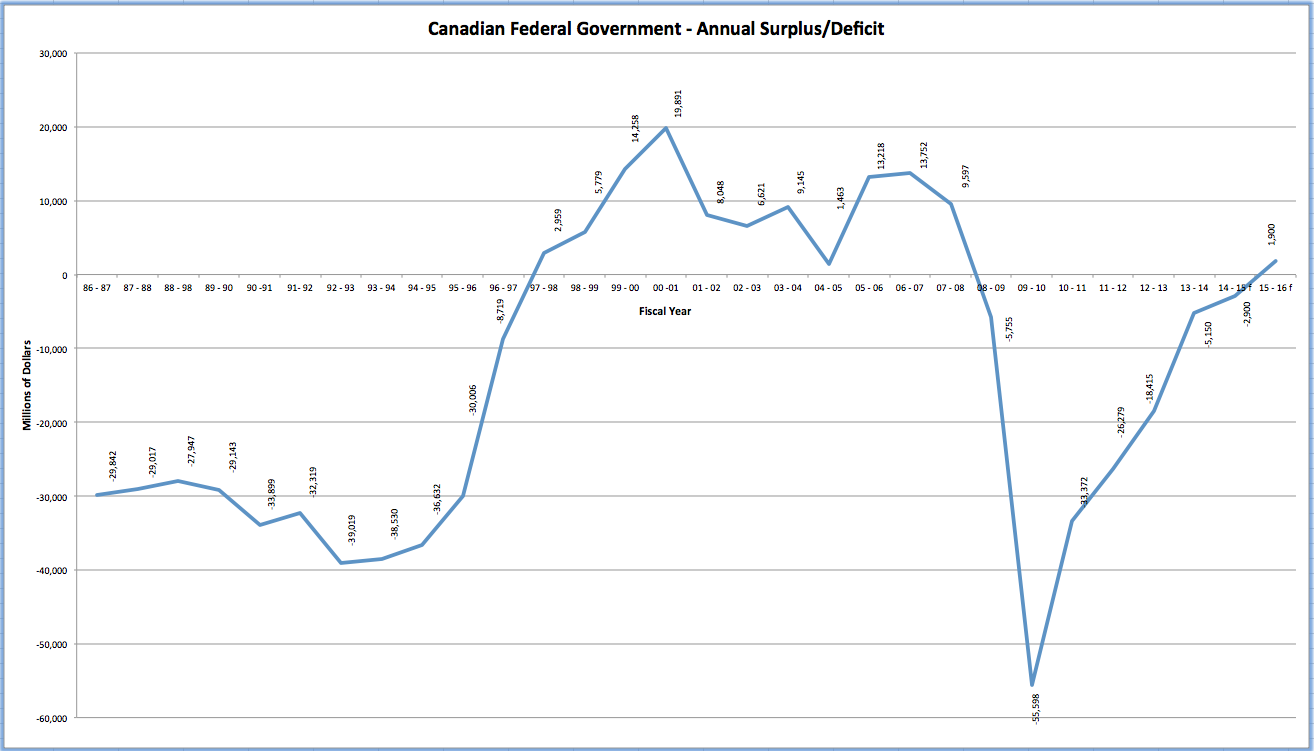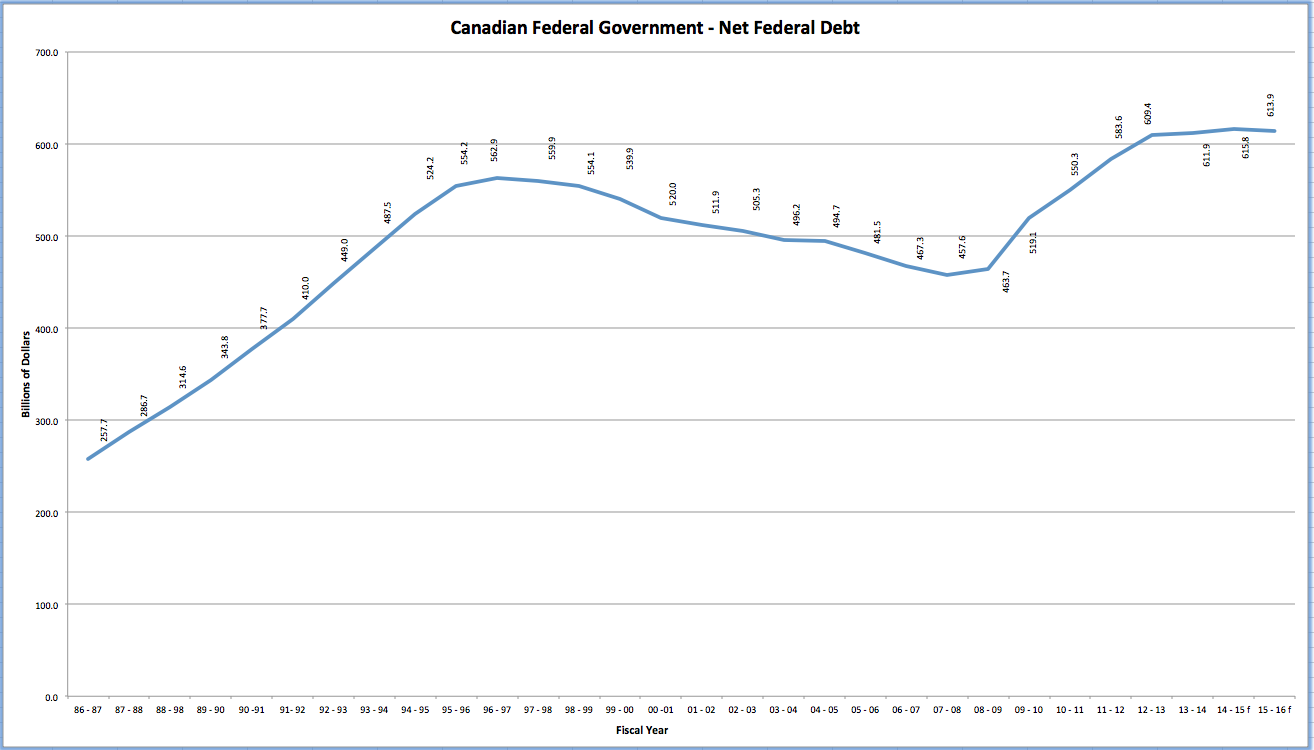This article was last updated on April 16, 2022
Canada: ![]() Oye! Times readers Get FREE $30 to spend on Amazon, Walmart…
Oye! Times readers Get FREE $30 to spend on Amazon, Walmart…
USA: ![]() Oye! Times readers Get FREE $30 to spend on Amazon, Walmart…With the Harper government about to unveil its belated 2015 – 2016 budget, I thought that we should take this opportunity to look back in history and see how the Harper government's budgetary habits have compared to those of past federal governments. For this posting, I have sourced my data fromthis TD Bank publication which is current to April 2015.
Oye! Times readers Get FREE $30 to spend on Amazon, Walmart…With the Harper government about to unveil its belated 2015 – 2016 budget, I thought that we should take this opportunity to look back in history and see how the Harper government's budgetary habits have compared to those of past federal governments. For this posting, I have sourced my data fromthis TD Bank publication which is current to April 2015.
Let's open by looking at Canada's political history since 1980:
1980 to 1984 – Pierre Trudeau (Liberal)
1984 to 1984 – John Turner (Liberal)
1984 to 1993 – Brian Mulroney (Progressive Conservative)
1993 to 2003 – Jean Chretien (Liberal)
2003 to 2006 – Paul Martin (Liberal)
2006 to 2011 – Stephen Harper (Conservative – minority)
2011 to present – Stephen Harper (Conservative – majority)
Now, let's look at a table that shows Canada's fiscal history since the fiscal year 1986 – 1987, during the later years of the Mulroney government:
As we can see, out of the past 30 fiscal years (including the projections for 2014 – 2015 and 2015 – 2016), the federal government has run a surplus for only 12 years with all but three of them either under the leadership of Paul Martin or under his guidance as Finance Minister. Over the 11 consecutive years that the budget was in a surplus situation, the average surplus was $9.521 billion with Canada's best fiscal performance occurring in 2000 – 2001 when the budget surplus hit $19.891 billion. On the other hand, the federal government has run a deficit for 18 out of the 30 years or 60 percent of the time. Over the 18 budget years that the government ran a deficit, the average deficit was $26.808 billion with Canada's worst nominal fiscal performance occurring in 2009 – 2010 when the budget deficit hit $55.598 billion. That single deficit erased all of the positive fiscal gains made between 2001 – 2002 and 2007 – 2008.
Now, let's look at the data in graphical form, starting with the annual deficit information:
This graph very clearly shows how the federal government has spent relatively little time in a balanced budget situation.
Here is a graph showing how Canada's federal net debt has grown since 1986:
The level of debt rose quite rapidly during the period from 1986 to 1997, growing from $257.7 billion to $562.9 billion, an increase of $305.2 billion or 118.4 percent. Between 1998 and 2009, the net federal debt dropped slowly, hitting a low of $457.6 billion in fiscal 2007 – 2008. Over that particular 11 year period, the debt dropped by $105.3 billion or 18.7 percent. Once the world economy began to experience the impact of the Great Recession, Canada, like many other nations, found it necessary to massively increase stimulus spending. Over the six year period from fiscal 2008 – 2009 to 2013 – 2014, the government spent a total of $144.569 billion more that it received in revenue. This pushed the net federal debt up to a peak of $611.9 billion in fiscal 2013 – 2014, an increase of $154.3 billion since Stephen Harper took control of the nation.
As I posted way back in 2012, as a Reform MP, Stephen Harper had what might be considered a very strong opinion on government fiscal balance. In reference to then-Alberta Premier Ralph Klein and his efforts to balance the province's budget back in 1994, Mr. Harper had this to say:
"Although I can't speak of the details because it is not my area of expertise, what Mr. Klein is doing in Alberta is, in principle, what governments need to do. He is taking a look at a situation that is unsustainable financially and he is taking the steps necessary through expenditure reductions to eliminate that financial uncertainty on a permanent basis within the life of a single Parliament. That is the only way it ever gets done. Any politician who says he is going to do it over two Parliaments is never going to do it. That's the golden rule. That's something that you can learn from Ralph Klein." (my bold)
Apparently, it's easier to talk about something than it is to actually do it.
While Mr. Harper and the Conservative Party of Canada will, no doubt, be campaigning on how well they have done at steering Canada's economy through the post-Great Recession era, in fact, we need to remember that his government has greatly increased the nation's federal debt. Right now, this increase seems relatively painless because interest owing on the debt is manageable in the current low interest rate environment, a factor that has made it somewhat easier to achieve fiscal balance. However, should interest rates rise back to something approaching a normal level, the pain of overspending by the Conservatives will become quite apparent. As well, with economic growth levels in both Europe and the United States remaining at only modest levels compared to normal inter-recessional rates and oil prices hitting multi-year lows, achieving fiscal balance over the long-term will become increasingly difficult for the next federal government, whoever they may be.
Click HERE to read more of Glen Asher's columns
You can publish this article on your website as long as you provide a link back to this page.




Be the first to comment